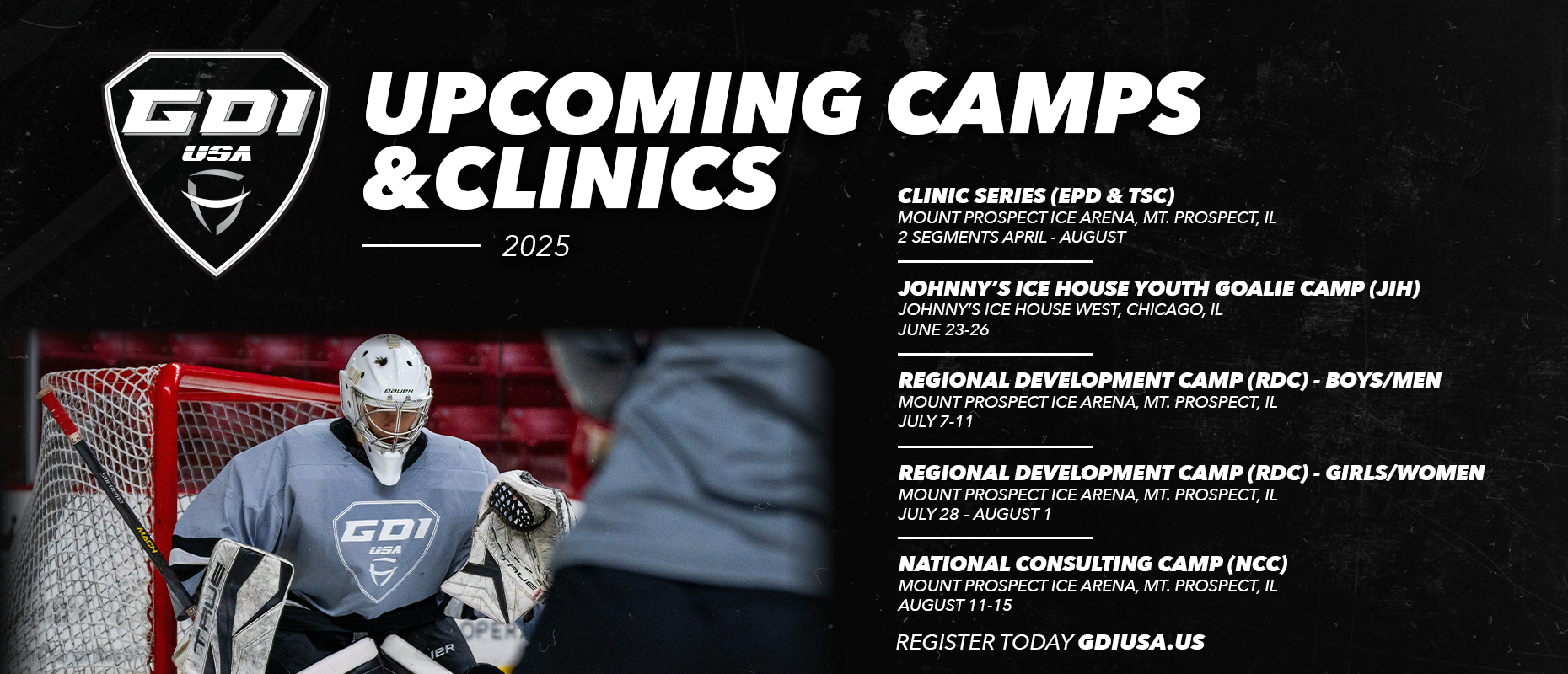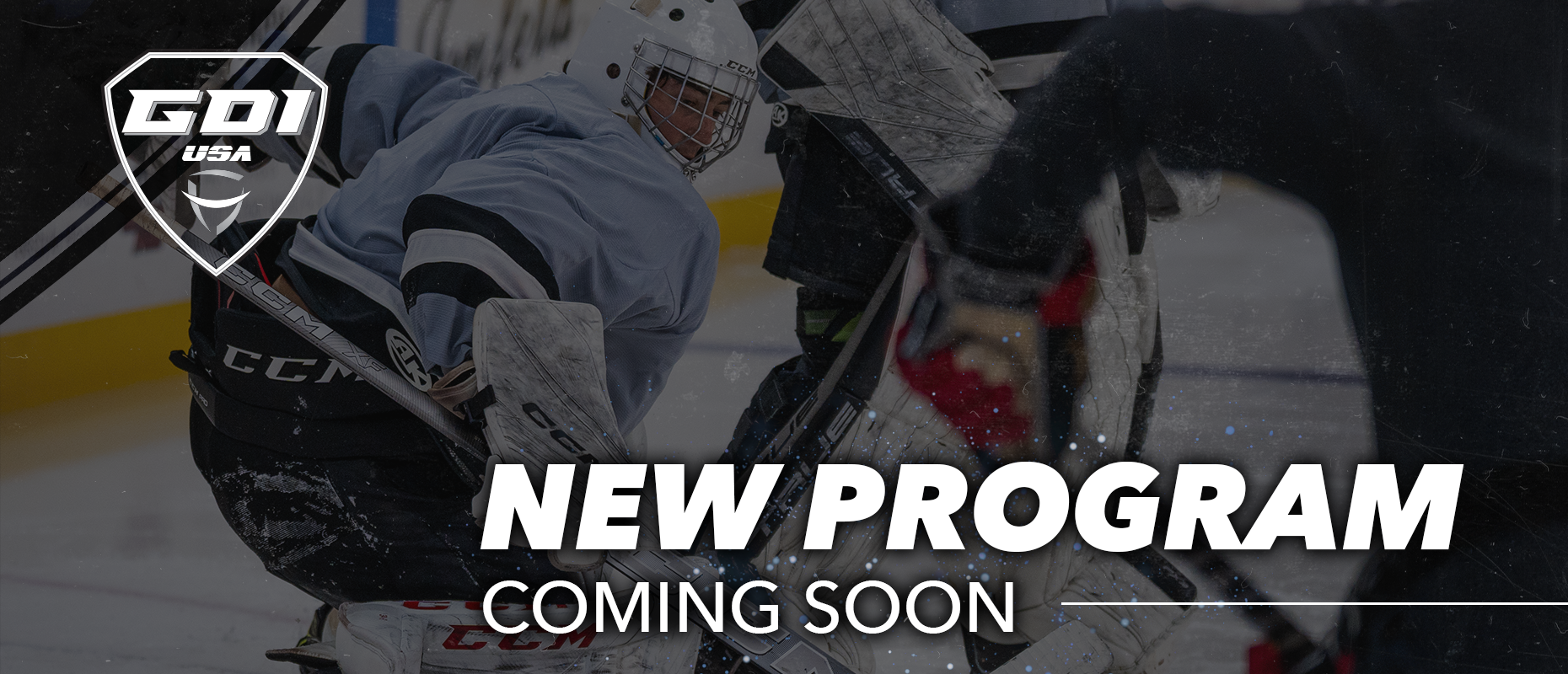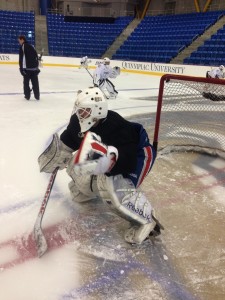In our 4rd installment of the Q5, we chat with ECHL South Carolina Stingrays Goaltender #35 Jeff Jakaitis. The Reigning 2013 Warrior Hockey ECHL Goaltender of the Month for October, ECHL Goaltender of the Week to start the month, and boasting a 7-0-2 Record with a 1.87 GAA and a .932 SP at the time of print, Jeff is off to a great start in his 7th pro season. Winner of the 2012 Reebok ECHL Goaltender of the Year Award, he has also played for 3 teams in the American Hockey League. We were honored to have Jeff on staff at the 2013 NDC: GDI EAST presented at Quinnipiac University as he added quite a unique perspective to our attending students as a current professional goaltender. With all of that experience beneath him, it is our pleasure to welcome Jeff Jakaitis to the Q5.
Q1: Let’s start off where we left off. You coached with us at the GDI camp at Quinnipiac, what did you take from that event? Whether pertaining to coaching philosophy or technical concept.
A: I really enjoyed the opportunity to coach at the GDI camp at Quinnipiac; it was great to work with the talented goalies and staff that attended. I think the aspect I enjoyed most was the dialogue among everyone throughout the week. I was really impressed with everyone’s motivation to learn, evolve, and express different points of view and I think that’s probably the most important thing I took away from the week. Goaltending is constantly changing and evolving and it’s important to study and keep improving all aspects of your game. I have never been an overly technical goalie but I learned a lot of terminology and techniques over the course of the week. I’m looking forward to more work in the future.
Q2: As a Minnesota High School (Rochester Mayo) and Division 1 (Lake Superior State) alumni, what were your expectations turning pro with the ECHL Columbia Inferno in 2007 and what is the biggest demand of the pro game?
A: To be honest I really wasn’t sure what to expect when I turned pro. The biggest difference I noticed from the start was the uncertainty of pro hockey. Coming out of college and high school, you commit to a school generally for four years and you know that’s where you’ll be. In pro hockey things can change very quickly, you can get called up, sent down, or released without any real warning so that was definitely a wakeup call. It’s really important to focus on your game and bring your best every night because if you don’t, you can get shipped out in a hurry. The biggest challenge is the schedule. In college you have an entire week to fit in workouts and prepare for two games; in pro hockey you have to learn to pick your spots a lot smarter. It makes it a lot more challenging to be consistent.
Q3: Your game is not like the “modern technical butterfly” goaltender. Yet you have achieved success at every level. How do you justify your game and what are the over-riding fundamental strengths within that game.
A: I’ve been able to incorporate more technique into my game through work with GDI but I think the two most important aspects of my game are being square to the shooter and depth. My coach in college named Don Muio always stressed being square to the shooter. The second thing I really focus on is depth, it’s important for me to take and hold as much ice as possible in order to make myself look bigger than I actually am. Those two things combined tend to give me a pretty good shot at stopping the puck. At the end of the day goaltending is all about stopping the puck to me, and I don’t get too concerned with how pretty it looks as long as the job gets done.
Q4: You have been dealing with this fact your entire career. You are a small goaltender. Most aspiring goalies are not 6’5”, like the elite level coaches and GM’s wish for. What challenges does this pose and how have you overcome them, technically or physically.
A: I was really lucky growing up to have a coach in squirts that stressed skating. I would have to do fifteen to thirty minutes of skating every practice before I ever saw a shot. I hated it at the time but it really laid the foundation for what has made me successful up to this point. As a smaller goalie you can make up for the lack in size by gaining a few extra inches of depth here and there. If you’re a better skater than the guy who is 6’5″ you can offset that height advantage. It’s definitely not the most enjoyable part of goaltending but you can never work on your skating too much. I’ve updated to more complicated “PSM” drills since the squirt days but I still work specifically on skating anytime I have a free moment on the ice.
Q5: How do you deal with a tough game or loss mentally? Confidence can be a fragile asset.
A: It may sound a bit cliché, but it’s important to have a very short memory as a goalie. Over the course of a season you are going to have tough losses or nights where you’re not at your best. I’ve had some good conversations with Director, GDI Carolinas Ted Monnich (who is pursuing a PhD in Sports Psychology) over the past few years about the mental side of goaltending. Things we’ve discussed include 1. the constant effort to improve and 2. training until failure. When you struggle or fail it can be a very valuable learning tool. Why did you fail? How can you fix it moving forward? When you look at a tough loss as a learning tool it can springboard your game rather than hold you back. One of the toughest things about goaltending is being consistent and it’s important to keep a very “in the moment” mindset. What happened on the shot before or what’s going to happen three shots from now isn’t important. All that matters is stopping the next shot. If you let in three early can you battle through it and make the big save late in the game to win 6-5 or do you give up? If you have a bad game can you bounce back and play well the next night? Anyone can play a great game under ideal circumstances, how do you play when you play under tough circumstances? The challenge is playing well on nights when you don’t feel good or things aren’t going you’re way. To me that’s what consistency is all about.
Thank you “Jako”, your time is appreciated. It’s great to have such an experienced and proven point of view. Keep rolling! Coach Honick is the Goaltending Consultant for the Stingrays this season, having the opportunity of continuing a 7 year partnership with Jeff.



